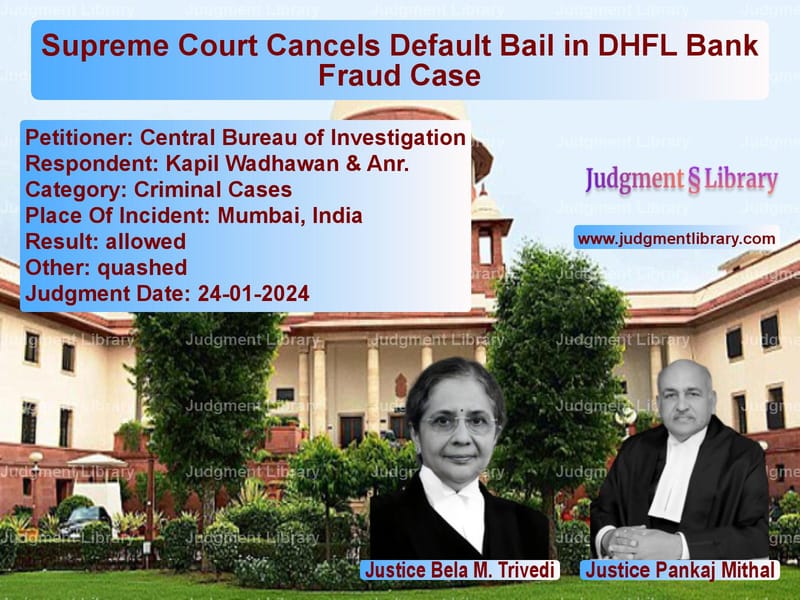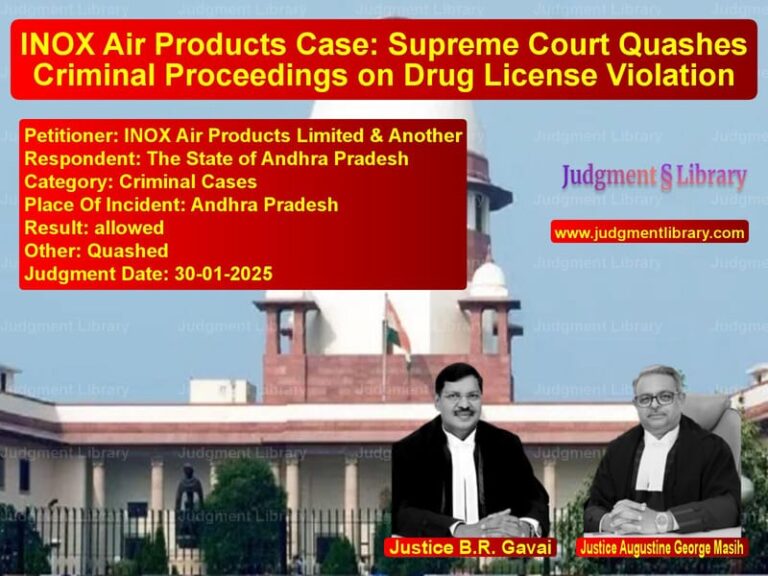Supreme Court Cancels Default Bail in DHFL Bank Fraud Case
The Supreme Court of India, in its judgment dated January 24, 2024, overturned the default bail granted to Kapil Wadhawan and Dheeraj Wadhawan in the ₹34,000 crore DHFL bank fraud case. The Court held that since the chargesheet was filed within the statutory period and cognizance was taken, the accused were not entitled to default bail under Section 167(2) of the CrPC.
Background of the Case
The case involves a massive financial fraud orchestrated by Dewan Housing Finance Corporation Ltd. (DHFL) and its key executives. An FIR was registered against DHFL and 12 other accused, including its then Chairman and Managing Director, Kapil Wadhawan, for allegedly cheating a consortium of 17 banks led by Union Bank of India. The accused were charged with misappropriating ₹34,000 crore between 2010 and 2019 by siphoning off bank loans through fraudulent means.
Read also: https://judgmentlibrary.com/supreme-court-acquits-murder-convict-due-to-lack-of-conclusive-evidence/
The Central Bureau of Investigation (CBI) arrested Kapil Wadhawan and Dheeraj Wadhawan on July 19, 2022. The agency filed a chargesheet on October 15, 2022, naming 75 accused persons and entities, including the Wadhawan brothers.
Key Legal Issues
- Whether the accused were entitled to default bail under Section 167(2) CrPC despite the filing of a chargesheet.
- Whether the chargesheet was incomplete because further investigation was ongoing.
- Whether the High Court erred in upholding the default bail granted by the Special Court.
Petitioner’s Arguments (CBI)
The CBI, represented by Additional Solicitor General S.V. Raju, argued that:
- The chargesheet was complete as per Section 173(2) CrPC, and further investigation under Section 173(8) did not affect its validity.
- The Special Court took cognizance of the chargesheet, making the accused ineligible for default bail.
- Default bail is only available when no chargesheet is filed within the statutory period, and in this case, the chargesheet was filed within time.
- Reliance was placed on past Supreme Court rulings, including Dinesh Dalmia v. CBI and M. Ravindran v. Intelligence Officer, Directorate of Revenue Intelligence, to support the argument that further investigation does not impact the validity of a chargesheet.
Respondent’s Arguments (Wadhawan Brothers)
The accused, represented by Senior Advocate Mukul Rohatgi and Amit Desai, contended that:
- The chargesheet was incomplete as the CBI explicitly stated in Paragraph 66 that further investigation was ongoing.
- Under Supreme Court precedent in Rakesh Kumar Paul v. State of Assam, an incomplete chargesheet does not prevent an accused from claiming default bail.
- The right to default bail is a statutory and fundamental right under Article 21 of the Constitution and cannot be denied based on procedural technicalities.
- The High Court correctly upheld the Special Court’s order granting default bail.
Supreme Court’s Observations
The Court analyzed the legal provisions and previous judgments before reaching its decision.
1. Filing of Chargesheet and Default Bail
“The benefit of proviso appended to sub-section (2) of Section 167 of the Code would be available to the offender only when a chargesheet is not filed and the investigation is kept pending against him. Once, however, a chargesheet is filed, the said right ceases.”
The Court held that since the CBI had filed a comprehensive chargesheet within the prescribed period, the accused could not claim default bail.
2. Effect of Further Investigation
“The pendency of further investigation qua the other accused or for production of some documents not available at the time of filing of chargesheet would neither vitiate the chargesheet nor entitle the accused to claim default bail.”
The Court ruled that further investigation under Section 173(8) CrPC does not impact the validity of an already filed chargesheet.
3. Cognizance of the Chargesheet
“Once from the material produced along with the chargesheet, the court is satisfied about the commission of an offence and takes cognizance, it is immaterial whether further investigation is pending or not.”
Since the Special Court had taken cognizance of the case, the Supreme Court ruled that the accused could not claim default bail.
Final Judgment
The Supreme Court set aside the High Court’s judgment and the Special Court’s order granting default bail, stating:
“Both, the Special Court as well as the High Court, having committed serious error of law in disregarding the legal position enunciated and settled by this Court, the impugned orders deserve to be set aside and are accordingly set aside.”
The Court ordered that the Wadhawan brothers be taken back into custody.
Key Takeaways from the Judgment
- Once a chargesheet is filed within the statutory period, an accused cannot claim default bail under Section 167(2) CrPC.
- Further investigation does not invalidate a filed chargesheet or revive an accused’s right to default bail.
- The court takes cognizance of the offence, not the offender, and pending investigation against other accused does not affect the validity of the chargesheet.
- Judicial interpretation of default bail must balance statutory rights with procedural compliance.
This judgment reinforces the principle that default bail cannot be misused as a loophole when investigating agencies comply with statutory requirements.
Petitioner Name: Central Bureau of Investigation.Respondent Name: Kapil Wadhawan & Anr..Judgment By: Justice Bela M. Trivedi, Justice Pankaj Mithal.Place Of Incident: Mumbai, India.Judgment Date: 24-01-2024.
Don’t miss out on the full details! Download the complete judgment in PDF format below and gain valuable insights instantly!
Download Judgment: central-bureau-of-in-vs-kapil-wadhawan-&-anr-supreme-court-of-india-judgment-dated-24-01-2024.pdf
Directly Download Judgment: Directly download this Judgment
See all petitions in Fraud and Forgery
See all petitions in Money Laundering Cases
See all petitions in Judgment by Bela M. Trivedi
See all petitions in Judgment by Pankaj Mithal
See all petitions in allowed
See all petitions in Quashed
See all petitions in supreme court of India judgments January 2024
See all petitions in 2024 judgments
See all posts in Criminal Cases Category
See all allowed petitions in Criminal Cases Category
See all Dismissed petitions in Criminal Cases Category
See all partially allowed petitions in Criminal Cases Category







